The Law West of Tombstone

Brief Synopsis
Cast & Crew
Glenn Tryon
Harry Carey
Tim Holt
Evelyn Brent
Jean Rouverol
Clarence Kolb
Film Details
Technical Specs

Synopsis
In 1881, William "Bonanza Bill" Barker arrives in New York from El Paso to convince millionaire Samuel Kent to invest in a mining scheme. Barker, whose reputation as a big talker precedes him, learns that Kent's current lover is Clara Martinez, his long-lost wife from El Paso, and uses his discovery to gain access to Kent. When Kent is informed of Barker's shady past, however, he tricks the Westerner into leaving the city empty-handed. Back in El Paso, Barker is persuaded by a local judge to go West with a law book and hunt down "The Tonto Kid," a young outlaw. Barker also learns that his daughter, Nitta Moseby, who believes that her father died at Gettysburg, is on her way West to marry a rancher named Danny Sanders. After The Kid holds up the train on which Nitta is traveling and steals her engagement ring, Nitta jumps off and demands its return. Attracted to the feisty Nitta, The Kid, who is also called Ted, takes her to his campfire, where he is surprised by the arrival of "sure-shot" Barker. Relieved of his booty, The Kid rides off, leaving Nitta in Barker's care. When Barker realizes that Nitta is his daughter, he decides to organize the new railroad community of Martinez, Arizona, and convinces the locals to name him temporary mayor. That same night, The Kid is confronted by Danny, who is actually a fellow outlaw. Danny draws his gun on The Kid and is killed. Outraged, Nitta accuses The Kid of murder, which inspires Barker to press the outlaw to finance Nitta's ranch with his booty. While The Kid quietly helps Nitta with her new ranch, Barker fights with the outlaw McQuinn brothers, who are using a government-placed Indian tribe to obtain control of valuable river land. On the day of the town's first official mayoral election, Barker, whose popularity is on the wane, is saved by the arrival of Clara and Kent. Barker convinces the Indian tribe to re-locate in California and puts them on Clara's train. Outsmarted by Barker, the McQuinns provoke a gun battle, which Barker and The Kid finally win. As Barker is re-instated as mayor, Nitta, who has tricked Barker into revealing that Danny was a cowardly scoundrel, marries the reformed Kid.

Director
Glenn Tryon
Cast
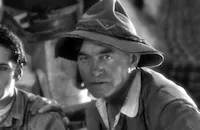
Harry Carey
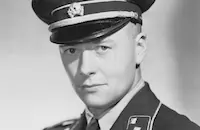
Tim Holt
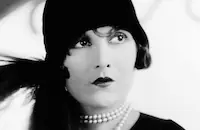
Evelyn Brent
Jean Rouverol
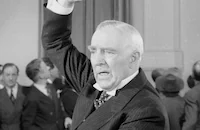
Clarence Kolb
Allan Lane
Esther Muir

Bradley Page
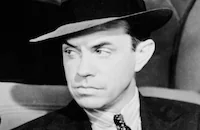
Paul Guilfoyle
Robert Moya

Ward Bond

George Irving
Monte Montague
Crew
George Crone
Albert D'agostino
J. Roy Hunt
Lee Marcus
Van Nest Polglase
Cliff Reid
Samuel Ruman
John Twist
Roy Webb
Earl A. Wolcott
Clarence Upson Young
Clarence Upson Young

Film Details
Technical Specs

Articles
The Law West of Tombstone
Here, Carey plays a cowboy con man, Bonanza Bill Barker, who stubs his toe trying to scam Wall Street tycoon Sam Kent (Clarence Kolb) and finds himself on a train back to El Paso through the good offices of the tycoon's mistress (Evelyn Brent), who appreciates Bill remaining silent about their colorful past. In no time, armed with a statute book, he's off in search of a Billy the Kid-like outlaw. The one thing about Bill that's genuine is that he's a skilled sharpshooter, although he relies more on his silver tongue than silver bullets. He fast-talks his way into the dual job of sheriff and mayor of a soon-to-be railroad town named Martinez. Along the way, he meets his grown daughter (Jean Rouverol), who believes her father died a hero at Gettysburg. Of course, she falls for the outlaw, boyish Tim Holt. Rounding out the picture are a Doc Holliday substitute and the Clanton gang stand-ins, the McQuinn brothers.
Upon the latter, surprisingly, are hung the farrago of a plot's only unusual aspect - its acknowledgment and respect for the fact that Native Americans, by treaty, get dibs on land. The McQuinns use the Indians to front for them so they can control rich grazing land on the Martinez side of the river. Who expected to find a scrupulous regard for Indian rights in a B-Western with which A-movies almost never bothered? Not that the Indians are anything but pure Hollywood. So is Bill's solution to enable the good guys to finally access the land. Carey moves with too much naturalistic assurance to be called swagger - not for him the flamboyant cowboy style. To many in his time, he was the successor to William S. Hart, the face of the genre, an icon with his rugged face, features seemingly hewn from weathered granite, and a strong baritone voice. He's more than up to the heroics he's assigned. But mostly he stays in large-hearted, good-sport comic mode (cowboy humorist Will Rogers said Carey was his big influence).
Quickly befriending the town's new madam (Esther Muir), Bill sets up court, a la Judge Roy Bean, in the town saloon. His first civic improvement is to commission a sign saying "Drinks and Split-Second Justice." Hopping onto the bar, gunning down a spider crawling up a post across the room, he roars "Court's in session." What makes him entertaining is the ease with which he sashays through the film, however clichéd and illogical it may get in the service of plunking into the story what it needs at that moment. Even trifling films have to be anchored, and Carey anchors this one effortlessly, holding it together with a grin here, a squint there, a dead shot or two in between. He all but defies you not to have a good time watching him play Mr. Fixit. But why would you not want to? You want to get in on the good time he's having.
If Carey was a cowboy born in The Bronx (although he bought his own ranch soon after clicking in movies and immersed himself in Western ways), Holt, raised on a ranch in Fresno, was the son of another early Western star, Jack Holt. He made his film debut at 9, playing his father's character as a boy in The Vanishing Pioneer (1928). When he began appearing as an adult, the baby-faced younger Holt arrived with a full cowboy skill set, including horsemanship and always wearing gloves, as he insisted working cowboys always did. Today he's chiefly remembered as the young cavalry officer in Stagecoach (1939), the vicious son in The Magnificent Ambersons (1942), Virgil Earp in Ford's My Darling Clementine (1946) and especially as Humphrey Bogart's young fellow prospector partner in The Treasure of the Sierra Madre (1948) -- in which the elder Holt has a cameo as a bum in a Mexican flophouse. But this actor who loved rodeos and retired to a ranch in Oklahoma was a pillar of B-Westerns, making some 40 of them.
Harry Carey and Harry Carey, Jr. appeared together in only one film: Howard Hawks' Red River (1948), but had no scenes together. The elder Carey died in 1947. Ford dedicated 3 Godfathers (1948) to him, and cast Harry Carey, Jr. as one of the three title-roleists. In fact, no degrees of separation exist between Western genre giants Ford, the Careys and John Wayne. Wayne has said that Carey and Yakima Canutt were the ones he learned most from and appropriated a Carey gesture at the end of The Searchers (1952) as homage. The elder Carey and Hoot Gibson bridged the gap between William S. Hart and John Wayne. Carey played opposite Wayne in several films and ushered him into the Careys' family circle when his own son was away during World War II. Harry Carey, Jr., meanwhile, was part of Ford's wartime photographic unit, and after the war became a Ford regular. The Law West of Tombstone reminds us that B-Westerns, in addition to being lively, efficiently-assembled fun, are not all to be unthinkingly scorned, especially when you consider the history and linkages that got some of them there.
by Jay Carr

The Law West of Tombstone
Quotes
Trivia
Notes
RKO borrowed Tim Holt from Walter Wanger's studio for this film. Some reviewers commented on the similarity between Harry Carey's character and the real-life Judge Roy Bean (1825?-1903), a colorful American frontiersman who established himself as the unofficial "law west of the Pecos." Reviewers also compared Tim Holt's character to Billy the Kid, Jean Rouverol's to Calamity Jane, and the "McQuinn brothers" to Billy and Ike Clanton. These comparisons, however, are not supported strongly by the film's story. Modern sources add Kermit Maynard and Robert Kortman to the cast.














